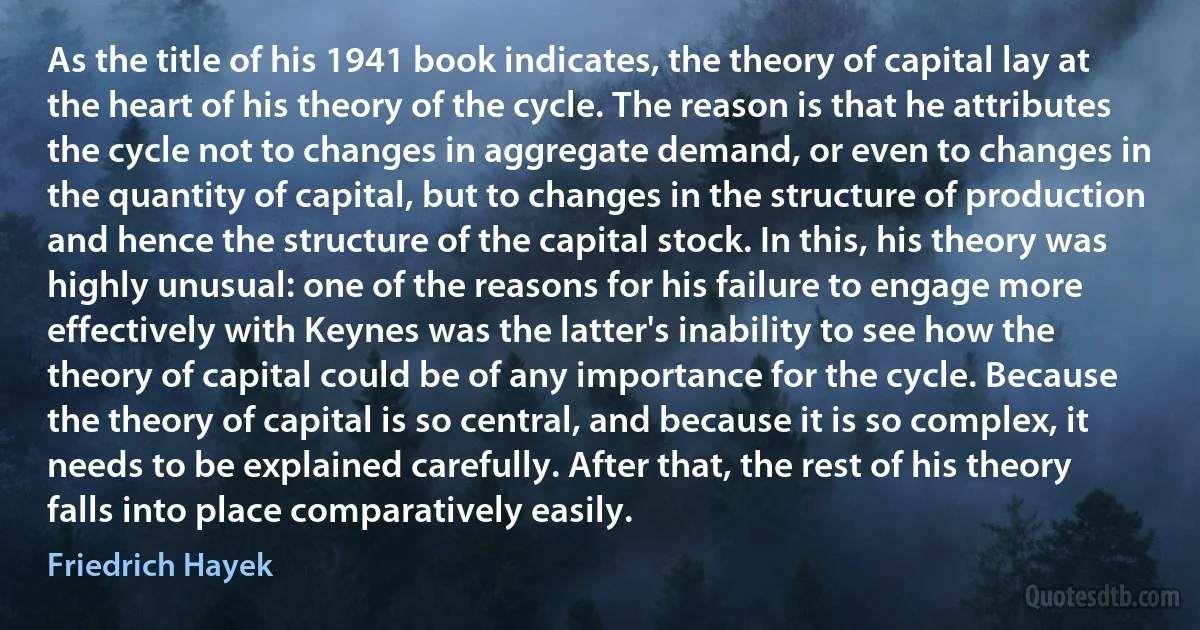
As the title of his 1941 book indicates, the theory of capital lay at the heart of his theory of the cycle. The reason is that he attributes the cycle not to changes in aggregate demand, or even to changes in the quantity of capital, but to changes in the structure of production and hence the structure of the capital stock. In this, his theory was highly unusual: one of the reasons for his failure to engage more effectively with Keynes was the latter's inability to see how the theory of capital could be of any importance for the cycle. Because the theory of capital is so central, and because it is so complex, it needs to be explained carefully. After that, the rest of his theory falls into place comparatively easily.
Friedrich HayekRelated topics
aggregate book central complex cycle failure heart inability lay needs place production reason rest see keynes fallsRelated quotes
Education will enable young people quickly to familiarize themselves with the whole system of production and to pass from one branch of production to another in response to the needs of society or their own inclinations. It will, therefore, free them from the one-sided character which the present-day division of labor impresses upon every individual. Communist society will, in this way, make it possible for its members to put their comprehensively developed faculties to full use. But, when this happens, classes will necessarily disappear. It follows that society organized on a communist basis is incompatible with the existence of classes on the one hand, and that the very building of such a society provides the means of abolishing class differences on the other.

Friedrich Engels
It is one of the most beautiful characteristics of Theosophy that it gives back to people in a more rational form everything which was really useful and helpful to them in the religions which they have outgrown... in this teaching as to the immortality of the soul and the life after death, Theosophy...does not put forward these great truths merely on the authority of some sacred book of long ago; in speaking of these subjects it is not dealing with pious opinions, or metaphysical speculations, but with solid, definite facts, as real and as close to us as the air we breathe or the houses we live in - facts of which many among us have constant experience - facts among which lies the daily work of some of our students, as will presently be seen.

Charles Webster Leadbeater
The sentence, 'stopping the printing presses,' is a figurative expression, because it is being done now by creating credit by the Federal Reserve System. But this is government action - all inflation is ultimately the result of activities which government determines and can control. And all inflations have been stopped in the past by the government stopping creating money, or preventing the central bank from creating more money. May I add just one thing? See, all inflations have been stopped by people who created or believed in a very naive form of the Quantity Theory, and acted on that. It may be wrong, but it is the only adequate theory effective to stop an inflation.

Friedrich Hayek
...another cause of today's instability is that we now have a society in America, Europe and much of the world which is totally dominated by the two elements of sovereignty that are not included in the state structure: control of credit and banking, and the corporation. These are free of political controls and social responsibility and have largely monopolized power in Western Civilization and in American society. They are ruthlessly going forward to eliminate land, labor, entrepreneurial-managerial skills, and everything else the economists once told us were the chief elements of production. The only element of production they are concerned with is the one they can control: capital.

Carroll Quigley
The tax upon land values is, therefore, the most just and equal of all taxes. It falls only upon those who receive from society a peculiar and valuable benefit, and upon them in proportion to the benefit they receive. It is the taking by the community, for the use of the community, of that value which is the creation of the community. It is the application of the common property to common uses. When all rent is taken by taxation for the needs of the community, then will the equality ordained by Nature be attained. No citizen will have an advantage over any other citizen save as is given by his industry, skill, and intelligence; and each will obtain what he fairly earns. Then, but not till then, will labor get its full reward, and capital its natural return.

Henry George
